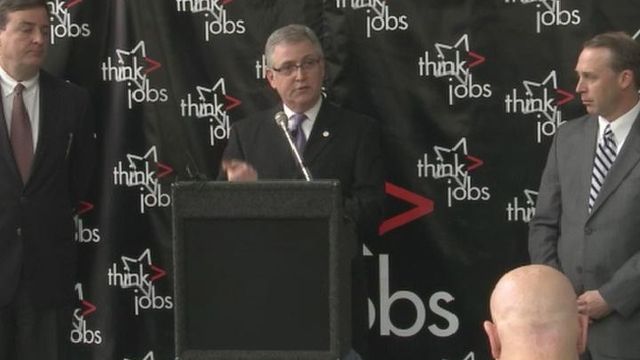Groups set up unemployment reform debate
The Chamber of Commerce and other business groups are pushing a sweeping remake of unemployment insurance laws. Democrats and members of the Urban League say lawmakers need to avoid "cutting workers off at the knees."
Posted — Updated"Right now, jobs in this state cost too much," said Lew Ebert, president of the North Carolina Chamber, one of the primary movers behind the "Reemployment Coalition," a group of business interests pushing for unemployment reform. Many features of the unemployment bill that will be heard Thursday have been championed by the coalition generally and the North Carolina Chamber specifically.
During the recession, North Carolina has racked up more than $2.5 billion in debt to the federal government. That money was used to pay state unemployment claims. Ebert and Bruce Clark, president of Capital Associated Industries, said the $21 per employee per year hike to federal unemployment taxes will discourage employers from hiring.
The House plan will reduce benefits for unemployed workers effective July 1 and raise taxes on businesses to repay the debt more quickly.
Most controversially, making those changes effective July 1 will cut off federally-funded benefits to workers who have been unemployed for more than 26 weeks. That's because federal law cuts off long-term benefits in any state that changes its program. Right now, roughly 80,000 people are receiving long-term, federally funded unemployment assistance.
Ebert and other backers of the House bill said that North Carolina needs to be able to get its fiscal house in order and that unemployment benefits were never meant to be a long-term entitlement.
But Democratic lawmakers and members of the Winston-Salem Urban League, a group that among other things provides job training and counseling, said that helping unemployed workers transition to needs jobs should be part of the bill.
"Cutting workers off at the knees will not be the answer," said Rep. Larry Hall, D-Durham, the House minority leader.
Rep. Marcus Brandon, D-Guilford, said lawmakers should look not only a money for job training, but put money toward groups like the Urban League that help people find jobs with that work.
He added that the long-term unemployment fix needed to do a better job of helping those who will lose benefits as a result of reform.
"Most of the folks in my community are starving today," he said.
Clark said that the unemployment bill will help move people into work. A key feature, he said, would be to require that unemployment recipients physically come to an Employment Security Office between the time they first file for benefits and the time they receive their second weekly unemployment check.
Right now, he said, too many people can file for unemployment electronically without ever talking to someone about how they are looking for work or what kind of additional job training they may need.
"That central feature of coming down an having that conversation is more important than any program with a catchy name," Clark said.
Copyright 2024 by Capitol Broadcasting Company. All rights reserved. This material may not be published, broadcast, rewritten or redistributed.






